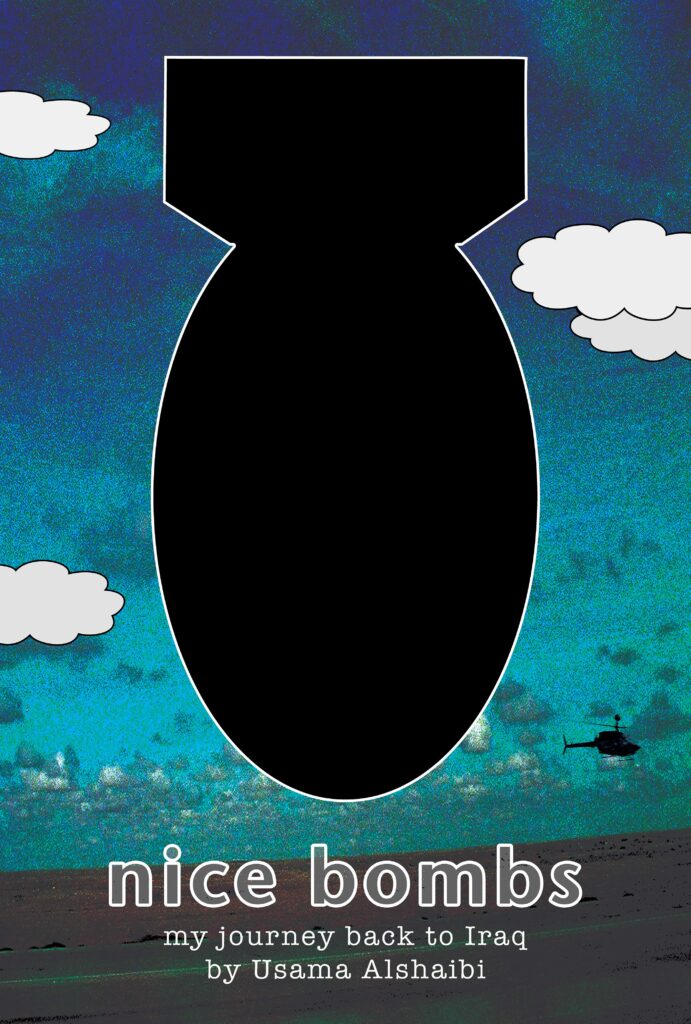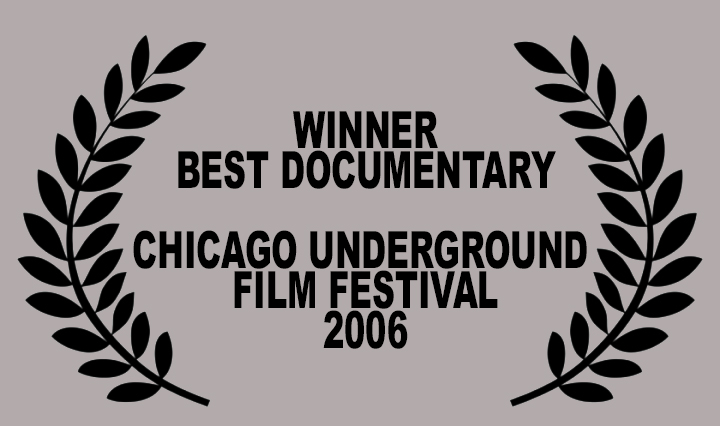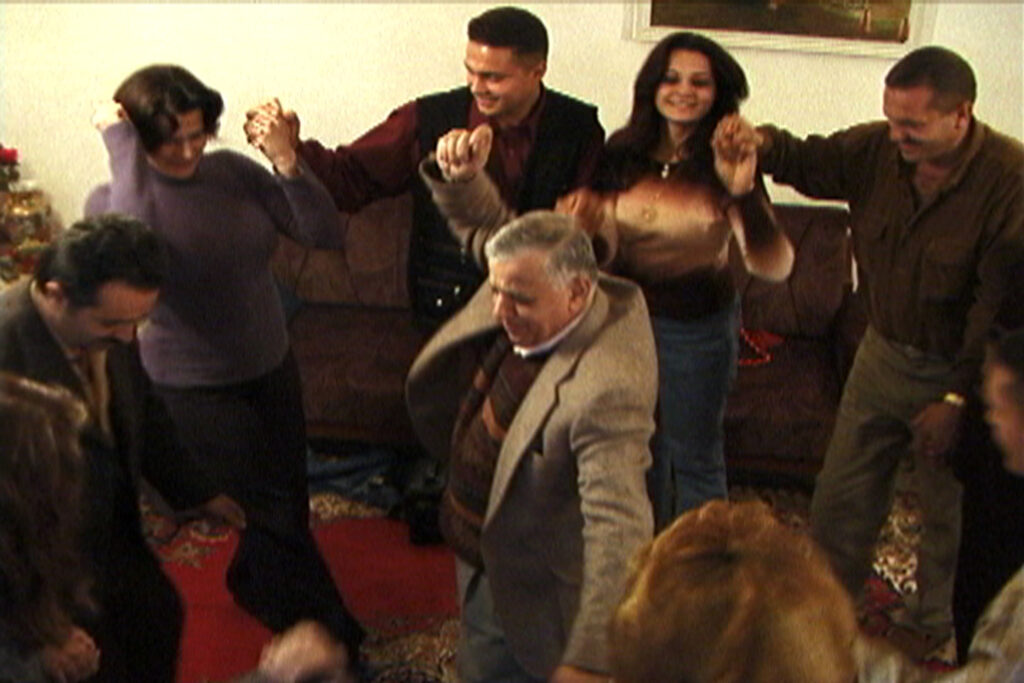 “thoroughly engaging …offers a uniquely time-layered vision of the war.” –Variety
“thoroughly engaging …offers a uniquely time-layered vision of the war.” –Variety
“…a surprisingly warm first-person video diary… edited with grace and tact.” –Chicago Tribune by Michael Phillips
“Loaded with candid conversations and opinions about the hot-button issues of war, terrorism, and Islamic extremism,’Nice Bombs’ offers many different Iraqi and American points of view and portrays a time and place of nightmarish complexity.” –New York Sun
“Chicago filmmaker Usama Alshaibi grew up in Iraq and the U.S., and although he recently became an American citizen, his personal video documentary has plenty to say about the day-to-day existence of his Baghdad relatives, whom he visited in 2004. Distance tends to simplify our view of anything, and this video humanizes the situation on the ground mostly by complicating it: in a voice-over Alshaibi says he’s often asked what “”the Iraqis” think, but by the end this question has become as meaningless as asking what “the Americans” think. Much of his previous work has been experimental, but this becomes formally adventurous only near the end, as he converses by phone with a cousin who tells him how much worse the situation has grown this year.” -Jonathan Rosenbaum, Critics Choice, Chicago Reader

Directed by Usama Alshaibi
Produced by Kristie Alshaibi, Ben Berkowitz & Ben Redgrave
Edited by Amy Cargill, Michael Palmerio & Usama Alshaibi
Sound Mix Jacob Ross at Experimental Sound Studio
Original score written and performed by
Naeif Rafeh, Issa Boulos & Omar al-Musfi
Additional music written and performed by
Crumpler, Strepsata, M. Gladney & Andy Ortmann
With Additional Funding from
The Playboy Foundation & Tribeca All Access Connects
A Project of Creative Capital
76 minutes/ color/ video/ 2006
Watch Nice Bombs (click here)
World Premiere
Chicago Underground Film Festival, Music Box Theater, 2006
Christie Hefner and Studs Terkel introduce the film
Theatrical Release
Pioneer Theater, New York City, July, 2007
Gene Siskel Film Center, Chicago, July 2007
Broadcast Premiere
Sundance Channel, broadcast on March 19, 2008-2009
In Nice Bombs filmmaker Usama Alshaibi returns to Baghdad to reunite with his family after nearly 24 years. This documentary navigates through his unique relationship to an Iraq that is much different than the country of his childhood. Usama captures the conflicting reactions to the conditions of life in Baghdad. Through a wide range of opinions and experiences he provides a broad panorama of voices long neglected under Saddam’s regime. His cousin Tareef enters the room upon hearing an explosion. “It’s a bomb. A Nice Bomb,” he explains. The phrase is indicative of his family’s nonchalance about their situation. As one young boy put it, “We’re Iraqis. It’s normal.” With humor and resilience Nice Bombs explores Usama’s dual role as both Iraqi and American.

“I was born in Iraq,” says Usama Alshaibi, “and was recently sworn in as a citizen of the nation that was now attacking it.” At the start of his documentary, Nice Bombs, it’s March 2003, and Alshaibi is safe in Amsterdam, honeymooning with his new wife Kristie. On TV, protests against the war are loud and numerous, followed by the seemingly unavoidable invasion. Within weeks, when Usama and Kristie are back home in Chicago, the Saddam Hussein statue falls and looting commences. Alshaibi observes, “I had a feeling that the news I read and saw was not telling me the full story.”-by Cynthia Fuchs, PopMatters, July 18 2007
When Studs Terkel urges you to do something, you do it. “He sort of put me on the spot,” recalls Usama Alshaibi, who was working at the Chicago History Museum as a sound engineer when his project sparked Terkel’s interest. It was January 2004 when the legendary author and historian came into Alshaibi’s office and asked about his family in Baghdad. Alshaibi replied, “Well, I have this idea about going to Iraq and interviewing my family….” And that’s what set Terkel off. “He said, ‘You have to go!’ ” Alshaibi says. “He pulled out his checkbook and gave me my first donation. -Jason Mojica, Time Out Chicago, August 10, 2006
Alshaibi does something so simple yet, sadly, so neglected: He lets a Western audience see Iraqis not as crazed Middle Easterners shouting and shooting (and dying) en masse, but as individuals going about their daily lives–shopping, listening to the radio, hanging out. Those shared-humanity moments make all the more compelling the postscript phone call, in which Tareef tells Alshaibi that, since his visit, Iraq has gone from tolerably bad to almost irredeemably worse.–Time Out Chicago, Novid Parsi August 2006
Nice Bombs Blogger: http://nicebombs.blogspot.com/
Interviews
Interview by Ignatiy Vishnevetsky
Interview by Ray Pride
Creative Capital Artist Profile